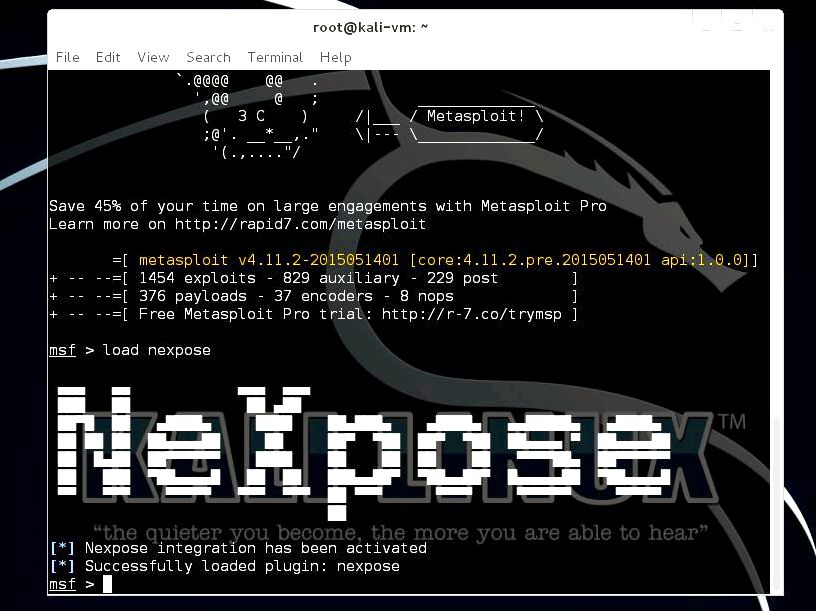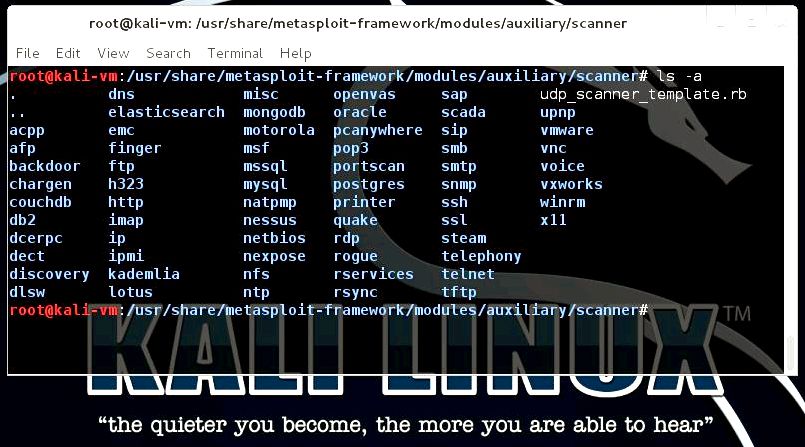Scanner discovery auxiliary modules – metasploit unleashed
Contents
Whenever your target systems are on the same network as the attacking machine, you are able to enumerate systems by performing an ARP scan. Naturally, Metasploit includes a module to help you out.
msf > use auxiliary/scanner/discovery/arp_sweep
msf auxiliary(arp_sweep) > show options
Module options (auxiliary/scanner/discovery/arp_sweep):
Name Current Setting Needed Description
—- ————–:——:———-
INTERFACE no The specific interface
RHOSTS yes The prospective address range or CIDR identifier
SHOST no Source Ip
SMAC no Source MAC Address
THREADS 1 yes The amount of concurrent threads
TIMEOUT 5 yes The amount of seconds to hold back for brand new data
Because of the way ARP checking is conducted, you have to pass your MAC address and source Ip towards the scanner for it to operate correctly.
msf auxiliary(arp_sweep) > set RHOSTS 192.168.1.200-254
RHOSTS => 192.168.1.200-254
msf auxiliary(arp_sweep) > set SHOST 192.168.1.101
SHOST => 192.168.1.101
msf auxiliary(arp_sweep) > set SMAC d6:46:a7:38:15:65
SMAC => d6:46:a7:38:15:65
msf auxiliary(arp_sweep) > set THREADS 55
THREADS => 55
msf auxiliary(arp_sweep) > run
[*] 192.168.1.201 seems to become up.
[*] 192.168.1.203 seems to become up.
[*] 192.168.1.205 seems to become up.
[*] 192.168.1.206 seems to become up.
[*] 192.168.1.250 seems to become up.
[*] Scanned 55 of 55 hosts (100% complete)
[*] Auxiliary module execution completed
msf auxiliary(arp_sweep) >
Because you will see when running this module, ARP checking becomes manifest pretty quickly.
ipv6_neighbor
The ipv6_neighbor auxiliary module probes the neighborhood network for IPv6 hosts that react to Neighbor Solicitations having a link-local address. This module, such as the arp_sweep one, will normally only work inside the attacking machine’s broadcast domain.

msf > use auxiliary/scanner/discovery/ipv6_neighbor
msf auxiliary(ipv6_neighbor) > show options
Module options:
Name Current Setting Needed Description
—- ————–:——:———-
INTERFACE no The specific interface
PCAPFILE no The specific PCAP capture file to process
RHOSTS yes The prospective address range or CIDR identifier
SHOST yes Source Ip
SMAC yes Source MAC Address
THREADS 1 yes The amount of concurrent threads
TIMEOUT 500 yes The amount of seconds to hold back for brand new data
Whenever your target systems are on the same network as the attacking machine, you are able to enumerate systems by performing an ARP scan. Naturally, Metasploit includes a module to help you out.
msf > use auxiliary/scanner/discovery/arp_sweep
msf auxiliary(arp_sweep) > show options
Module options (auxiliary/scanner/discovery/arp_sweep):
Name Current Setting Needed Description
—- ————–:——:———-
INTERFACE no The specific interface
RHOSTS yes The prospective address range or CIDR identifier
SHOST no Source Ip
SMAC no Source MAC Address
THREADS 1 yes The amount of concurrent threads
TIMEOUT 5 yes The amount of seconds to hold back for brand new data
Because of the way ARP checking is conducted, you have to pass your MAC address and source Ip towards the scanner for it to operate correctly.
msf auxiliary(arp_sweep) > set RHOSTS 192.168.1.200-254
RHOSTS => 192.168.1.200-254
msf auxiliary(arp_sweep) > set SHOST 192.168.1.101
SHOST => 192.168.1.101
msf auxiliary(arp_sweep) > set SMAC d6:46:a7:38:15:65
SMAC => d6:46:a7:38:15:65
msf auxiliary(arp_sweep) > set THREADS 55
THREADS => 55
msf auxiliary(arp_sweep) > run
[*] 192.168.1.201 seems to become up.
[*] 192.168.1.203 seems to become up.
[*] 192.168.1.205 seems to become up.
[*] 192.168.1.206 seems to become up.
[*] 192.168.1.250 seems to become up.
[*] Scanned 55 of 55 hosts (100% complete)
[*] Auxiliary module execution completed
msf auxiliary(arp_sweep) >
Because you will see when running this module, ARP checking becomes manifest pretty quickly.
ipv6_neighbor
The ipv6_neighbor auxiliary module probes the neighborhood network for IPv6 hosts that react to Neighbor Solicitations having a link-local address. This module, such as the arp_sweep one, will normally only work inside the attacking machine’s broadcast domain.

msf > use auxiliary/scanner/discovery/ipv6_neighbor
msf auxiliary(ipv6_neighbor) > show options
Module options:
Name Current Setting Needed Description
—- ————–:——:———-
INTERFACE no The specific interface
PCAPFILE no The specific PCAP capture file to process
RHOSTS yes The prospective address range or CIDR identifier
SHOST yes Source Ip
SMAC yes Source MAC Address
THREADS 1 yes The amount of concurrent threads
TIMEOUT 500 yes The amount of seconds to hold back for brand new data
Additionally to setting our RHOSTS value, we should also set our source MAC address(SMAC) and source host(SHOST) Ip. Then we set our RHOSTS and THREADS values and allow the scanner run.

msf auxiliary(ipv6_neighbor) > set RHOSTS 192.168.1.2-254
RHOSTS => 192.168.1.200-254
msf auxiliary(ipv6_neighbor) > set SHOST 192.168.1.101
SHOST => 192.168.1.101
msf auxiliary(ipv6_neighbor) > set SMAC d6:46:a7:38:15:65
SMAC => d6:46:a7:38:15:65
msf auxiliary(ipv6_neighbor) > set THREADS 55
THREADS => 55
msf auxiliary(ipv6_neighbor) > run
[*] IPv4 Hosts Discovery
[*] 192.168.1.10 is alive.
[*] 192.168.1.11 is alive.
[*] 192.168.1.2 is alive.
[*] 192.168.1.69 is alive.
[*] 192.168.1.109 is alive.
[*] 192.168.1.150 is alive.
[*] 192.168.1.61 is alive.
[*] 192.168.1.201 is alive.
[*] 192.168.1.203 is alive.
[*] 192.168.1.205 is alive.
[*] 192.168.1.206 is alive.
[*] 192.168.1.99 is alive.
[*] 192.168.1.97 is alive.
[*] 192.168.1.250 is alive.
[*] IPv6 Neighbor Discovery
[*] 192.168.1.69 maps to IPv6 link local address fe80::5a55:caff:fe14:1e61
[*] 192.168.1.99 maps to IPv6 link local address fe80::5ab0:35ff:fe6a:4ecc
[*] 192.168.1.97 maps to IPv6 link local address fe80::7ec5:37ff:fef9:a96a
[*] Scanned 253 of 253 hosts (100% complete)
[*] Auxiliary module execution completed
msf auxiliary(ipv6_neighbor) >
Searching in the module output, you can observe this scanner serves the twin-reason for showing what hosts are online much like arp_sweep after which performs the IPv6 Neighbor Discovery.
udp_probe
The udp_probe module scans confirmed selection of hosts for common UDP services. Note: This module is deprecated and could disappear anytime.
msf > use auxiliary/scanner/discovery/udp_probe
[!] ******************************************************************************************
[!] * The module scanner/discovery/udp_probe is deprecated! *
[!] * It will likely be removed on or about 2016-11-23 *
[!] * Use auxiliary/scanner/discovery/udp_sweep rather *
[!] ******************************************************************************************
msf auxiliary(udp_probe) > show options
Module options (auxiliary/scanner/discovery/udp_probe):
Name Current Setting Needed Description
—- ————–:——:———-
CHOST no The neighborhood client address
RHOSTS yes The prospective address range or CIDR identifier
THREADS 1 yes The amount of concurrent threads
You will find very couple of needed settings with this module therefore we just configure the RHOSTS and THREADS values and turn it on.
msf auxiliary(udp_probe) > set RHOSTS 192.168.1.2-254
RHOSTS => 192.168.1.2-254
msf auxiliary(udp_probe) > set THREADS 253
THREADS => 253
msf auxiliary(udp_probe) > run
[*] Discovered SNMP on 192.168.1.2:161 (GSM7224 L2 Managed Gigabit Switch)
[*] Discovered SNMP on 192.168.1.2:161 (GSM7224 L2 Managed Gigabit Switch)
[*] Discovered NetBIOS on 192.168.1.109:137 (SAMSUNG::U :SAMSUNG::U :00:15:99:3f:40:bd)
[*] Discovered NetBIOS on 192.168.1.150:137 (XEN-WIN7-PROD::U :WORKGROUP::G :XEN-WIN7-PROD::U :WORKGROUP::G :aa:e3:27:6e:3b:a5)
[*] Discovered SNMP on 192.168.1.109:161 (Samsung CLX-3160 Series OS V1.01.01.16 02-25-2008Engine 6.01.00NIC V4.03.08(CLX-3160) 02-25-2008S/N 8Y61B1GP400065Y.)
[*] Discovered NetBIOS on 192.168.1.206:137 (XEN-XP-PATCHED::U :XEN-XP-PATCHED::U :HOTZONE::G :HOTZONE::G :12:fa:1a:75:b8:a5)
[*] Discovered NetBIOS on 192.168.1.203:137 (XEN-XP-SPLOIT::U :WORKGROUP::G :XEN-XP-SPLOIT::U :WORKGROUP::G :3e:ff:3c:4c:89:67)
[*] Discovered NetBIOS on 192.168.1.201:137 (XEN-XP-SP2-BARE::U :HOTZONE::G :XEN-XP-SP2-BARE::U :HOTZONE::G :HOTZONE::U :__MSBROWSE__::G :c6:ce:4e:d9:c9:6e)
[*] Discovered SNMP on 192.168.1.109:161 (Samsung CLX-3160 Series OS V1.01.01.16 02-25-2008Engine 6.01.00NIC V4.03.08(CLX-3160) 02-25-2008S/N 8Y61B1GP400065Y.)
[*] Discovered NTP on 192.168.1.69:123 (NTP v4)
[*] Discovered NetBIOS on 192.168.1.250:137 (FREENAS::U :FREENAS::U :FREENAS::U :__MSBROWSE__::G :WORKGROUP::U :WORKGROUP::G :WORKGROUP::G :00:00:00:00:00:00)
[*] Discovered NTP on 192.168.1.203:123 (Microsoft NTP)
[*] Discovered MSSQL on 192.168.1.206:1434 (ServerName=XEN-XP-PATCHED InstanceName=SQLEXPRESS IsClustered=No Version=9.00.4035.00 tcp=1050 np=XEN-XP-PATCHEDpipeMSSQL$SQLEXPRESSsqlquery )
[*] Discovered NTP on 192.168.1.206:123 (Microsoft NTP)
[*] Discovered NTP on 192.168.1.201:123 (Microsoft NTP)
[*] Scanned 029 of 253 hosts (011% complete)
[*] Scanned 052 of 253 hosts (020% complete)
[*] Scanned 084 of 253 hosts (033% complete)
[*] Scanned 114 of 253 hosts (045% complete)
[*] Scanned 140 of 253 hosts (055% complete)
[*] Scanned 160 of 253 hosts (063% complete)
[*] Scanned 184 of 253 hosts (072% complete)
[*] Scanned 243 of 253 hosts (096% complete)
[*] Scanned 250 of 253 hosts (098% complete)
[*] Scanned 253 of 253 hosts (100% complete)
[*] Auxiliary module execution completed
msf auxiliary(udp_probe) >
As you can tell within the above output, our quick little scan discovered many services running on a multitude of platforms.
udp_sweep
The udp_sweep module scans across confirmed selection of hosts to identify generally available UDP services.
msf > use auxiliary/scanner/discovery/udp_sweep
msf auxiliary(udp_sweep) > show options
Module options (auxiliary/scanner/discovery/udp_sweep):
Name Current Setting Needed Description
—- ————–:——:———-
BATCHSIZE 256 yes The amount of hosts to probe in every set
RHOSTS yes The prospective address range or CIDR identifier
THREADS 10 yes The amount of concurrent threads
To configure this module, we simply need to set the RHOSTS and THREADS values and run it.
msf auxiliary(udp_sweep) > set RHOSTS 192.168.1.2-254
RHOSTS => 192.168.1.2-254
msf auxiliary(udp_sweep) > set THREADS 253
THREADS => 253
msf auxiliary(udp_sweep) > run
[*] Delivering 10 probes to 192.168.1.2->192.168.1.254 (253 hosts)
[*] Discovered NetBIOS on 192.168.1.109:137 (SAMSUNG::U :SAMSUNG::U :00:15:99:3f:40:bd)
[*] Discovered NetBIOS on 192.168.1.150:137 (XEN-WIN7-PROD::U :WORKGROUP::G :XEN-WIN7-PROD::U :WORKGROUP::G :aa:e3:27:6e:3b:a5)
[*] Discovered NetBIOS on 192.168.1.203:137 (XEN-XP-SPLOIT::U :WORKGROUP::G :XEN-XP-SPLOIT::U :WORKGROUP::G :3e:ff:3c:4c:89:67)
[*] Discovered NetBIOS on 192.168.1.201:137 (XEN-XP-SP2-BARE::U :HOTZONE::G :XEN-XP-SP2-BARE::U :HOTZONE::G :HOTZONE::U :__MSBROWSE__::G :c6:ce:4e:d9:c9:6e)
[*] Discovered NetBIOS on 192.168.1.206:137 (XEN-XP-PATCHED::U :XEN-XP-PATCHED::U :HOTZONE::G :HOTZONE::G :12:fa:1a:75:b8:a5)
[*] Discovered NetBIOS on 192.168.1.250:137 (FREENAS::U :FREENAS::U :FREENAS::U :__MSBROWSE__::G :WORKGROUP::U :WORKGROUP::G :WORKGROUP::G :00:00:00:00:00:00)
[*] Discovered SNMP on 192.168.1.2:161 (GSM7224 L2 Managed Gigabit Switch)
[*] Discovered SNMP on 192.168.1.109:161 (Samsung CLX-3160 Series OS V1.01.01.16 02-25-2008Engine 6.01.00NIC V4.03.08(CLX-3160) 02-25-2008S/N 8Y61B1GP400065Y.)
[*] Discovered NTP on 192.168.1.69:123 (NTP v4)
[*] Discovered NTP on 192.168.1.99:123 (NTP v4)
[*] Discovered NTP on 192.168.1.201:123 (Microsoft NTP)
[*] Discovered NTP on 192.168.1.203:123 (Microsoft NTP)
[*] Discovered NTP on 192.168.1.206:123 (Microsoft NTP)
[*] Discovered MSSQL on 192.168.1.206:1434 (ServerName=XEN-XP-PATCHED InstanceName=SQLEXPRESS IsClustered=No Version=9.00.4035.00 tcp=1050 np=XEN-XP-PATCHEDpipeMSSQL$SQLEXPRESSsqlquery )
[*] Discovered SNMP on 192.168.1.2:161 (GSM7224 L2 Managed Gigabit Switch)
[*] Discovered SNMP on 192.168.1.109:161 (Samsung CLX-3160 Series OS V1.01.01.16 02-25-2008Engine 6.01.00NIC V4.03.08(CLX-3160) 02-25-2008S/N 8Y61B1GP400065Y.)
[*] Scanned 253 of 253 hosts (100% complete)
[*] Auxiliary module execution completed
msf auxiliary(udp_sweep) >
With minimal effort, we’ve once more identified an array of services running on the majority of different platforms inside our network.
Resourse: https://offensive-security.com/metasploit-unleashed/scanner-discovery-auxiliary-modules/
